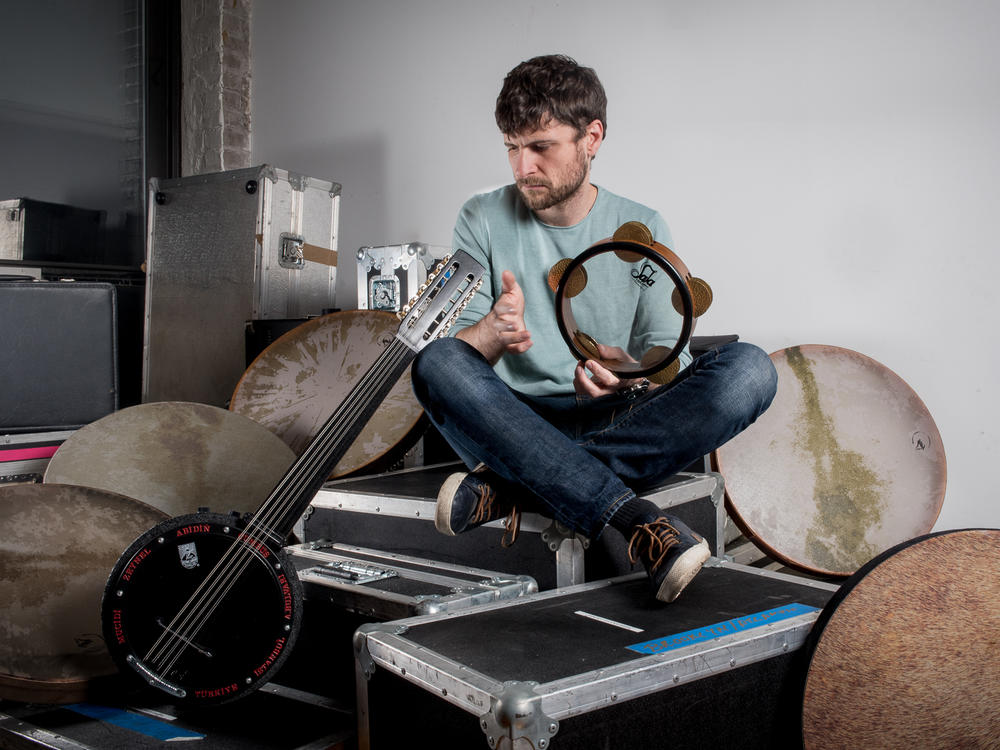Section Branding
Header Content
On 'The Last Friend,' Michael League Imagines Death As A Benevolent Companion
Primary Content
Morning Edition Song Project is the series where songwriters are asked to write an original song about the COVID era. The newest addition is brought by Michael League. He plays all kinds of instruments; he's a producer, too — and the lead of the jazz-fusion group Snarky Puppy.
League is American, but when he's not on tour, he lives in Spain. And it was 12 months ago this very week that Spain went into lockdown. League remembers the weekend it was announced: he lived in the north of Spain and his girlfriend lives in the south. He had to act fast. "Saturday night, they made the decision. I packed an overnight bag, bought a flight," he says. "And on Sunday, I flew on one of the last flights that, I think, that operated in Spain for months." League brought a backpack and this little keyboard he can control with his laptop. And that was about it. He thought, at that point, it would be a few weeks, a couple of months; he'd make some music and go home. "And I was wrong," he says, laughing.
But League put all of that time to good use. The artist wrote a solo album that he'd been putting off for five years. "I actually wrote the whole album in the three months that Spain was in lockdown," he says. There was nowhere else to go. League's "normal" life was seven to ten months on tour, mostly spent in transit — in planes, trains and busses. "Sleeping in the same bed every night and knowing that I physically couldn't go anywhere allowed me to set up a routine for the first time in my life," he says. "It was incredible."
Despite this newfound practice, League still had to watch the news in the U.S. unfold from miles away, which was hard. "For me, the fact that I was thousands and thousands of miles away and, like, watching this ship burn ... That was, I guess, in a word, like, 'surreal,' " he says. "And in another word, I guess, 'painful.' " The artist suffered tremendous loss during this period, as well as those around him. "I lost my grandmother two days after her 100th birthday party, at the very, very beginning of March last year. I lost my uncle," he recalls. "Snarky Puppy's manager — my manager lost his mother. One member of our band lost three family members. I mean, it's just kind of a thing that goes on and on." League had much to draw from when he sat down to write a song for our project, but it was this human toll and the very nature of death that he kept coming back to for his Morning Edition Song Project entry, "The Last Friend."
Michael League spoke with NPR's Rachel Martin about "The Last Friend" and another, more nurturing way of viewing death. Hear the radio version at the audio link, and read on for an edited transcript.
This interview has been edited for length and clarity.
So, how did that end up? Informing feels like the wrong word, but inspiring, opening up something in you that ended up being this song.
I wanted to engage with the idea of death in a way that's more linear. And rather than thinking of death as this hooded being that suddenly appears in your final moment and cuts your chord with the living world — to more think of it as a companion that knows you and that's been with you your whole life. And to try and personify it in a way that's less fearful.
And you titled it "The Last Friend." Which, I mean, for me, I actually find it a comforting idea to think of it as a constant. But not a threatening constant — it's just part of us as we move through this life.
Yeah. I just want to treat it as the obvious conclusion that we know it will be. But in a way that's just not — that's not scary and that's actually kind of nurturing, to return us to this place from whence we came.
You started talking about our traditional notion of death, the way we've personified it as a grim reaper who comes to us in these moments. In your visualization of death as a last friend, do you actually conjure an image of what's that like? What does death look like in this different articulation?
Whenever I'm writing songs, I kind of skip to the music video. [laughs] I find it that — maybe just being a child of VH1 and MTV in the 90's — that's just, where I go. It's actually a wonderful songwriting device to immediately start to create a visual world, I think, when you're writing lyrics. So, for the music video for this song, which there will never be one — but if there were one, I was imagining it, actually, as like a person whose face you never see, but is always, like, alongside — like a compassionate companion. That basically, the music video would be all of these different scenes with different people involved, but them always with, like, a friend — all the way until the final moment. You know, that was kind of the way I thought of it. I didn't think of it as a giant orange panda or something I thought of it as, although that would've been — that would have been an interesting twist for the lyrics.
Copyright 2021 NPR. To see more, visit https://www.npr.org.

